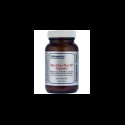Attention Deficit Disorder (ADD) and Attention Deficit Hyperactivity Disorder (ADHD) are developmental disorders that affect 5% of the United States population. They are most typical in children under the age of 19 but are frequently seen in adults. They typically begin during childhood and are characterized by a persistent pattern of inattention and/or hyperactivity, as well as forgetfulness, poor impulse control or impulsivity and distractibility. AD(H)D is currently considered to be a persistent and chronic condition for which biomedical intervention has proven to be helpful. AD(H)D is most commonly diagnosed in children, but over the past decade, has been increasingly diagnosed in adults. About 60% of children diagnosed with AD(H)D retain these conditions into adulthood. They appear to be highly inheritable, although one-fifth of all cases are felt to be caused by trauma or toxic chemical exposure. Therapeutic options include a combination of biomedical treatments, nutritional supplementation, and dietary modification. Behavioral modification, meditation, lifestyle change and counseling may be of some help. The scientific consensus in the field, and the consensus of the national health institutes of the world, is that AD(H)D are disorders which impair functioning and that many adverse life outcomes are associated with AD(H)D.
The most common symptoms of AD(H)D are:
- Distractibility
- Short-term memory loss
- Procrastination
- Difficulty with concentration & focus
- Tardiness
- Impulsivity
- Weak planning & execution
- Problems organizing ideas & belongings
Not all individuals with AD(H)D have all of these symptoms. Most ordinary people exhibit some of these behaviors but not to the point where they seriously interfere with the person’s work, relationships, studies, or cause depression or anxiety (children do not often have to deal with deadlines, organization issues, and long-term planning so these types of symptoms often become evident only during adolescence or adulthood when life demands become greater).
Hyperactivity is common among children with AD(H)D but tends to disappear during adulthood. However, over half of the children with AD(H)D continue to have symptoms of inattention throughout their lives. One of the things said by parents/teachers of children with AD(H)D is that it is very much like “having twenty televisions lined around oneself and having them all turned to different channels. The volume on each is constantly changing and one finds it hard to focus on any one thing.”
The Wycoff Wellness Center provides a unique and thorough process to evaluate children and adults with AD(H)D. Our process involves the following components:
An initial visit
- Provides a complete review of symptoms and past history
- Perform a head-to-toe physical
- Coordinate recommended testing (see below)
- Initiate basics of a treatment plan
First follow up visit
- To discuss results of all testing
- Develop a customized treatment plan
- Determine need for further testing
Follow up visits
- Follow up depends on individual treatment needs
- Typically follow up every 2-3 months or as needed
The Wycoff Wellness Center typically would recommend some or all of the following tests. The specific recommended diagnostic testing is an individual decision between a Wycoff Wellness Center provider and patient. Typical testing to be considered includes:
Complete blood count
To assess for anemia and blood cell problems
Chemistry panel
To assess glucose, electrolytes and liver/kidney function
Thyroid panel
To assess thyroid metabolism
Great Plains Laboratory testing (biomedical tests)
- Urine organic acid (OAT) test
- Comprehensive digestive stool analysis
- Plasma zinc and essential fatty acids
- Hair metal mineral analysis (heavy metal testing)
- IgG food allergy panel
The Wycoff Wellness Center’s staff will assist you in coordinating the necessary testing and explain the costs of such. Many of the basic testing costs would be covered by your typical insurance plan. Many of the biomedical testing may be covered by your insurance plan. Great Plains Laboratory does participate with Blue Cross/Blue Shield Insurance and many other insurance carriers.
The Wycoff Wellness Center’s providers will customize an individual treatment plan for each patient. Our treatments emphasize natural solutions. The typical treatment may include:
Elimination of foods which containing food dyes and artificial colors
Elimination & treatment of significant food allergies as determined by IgG allergy testing, IgE allergy testing or allergy skin testing
- Rotation Diet
- Sublingual (under-the-tongue) allergy drops
- Low Dose Allergy (LDA) Immunotherapy
Remove toxic metals
Chelation, oral or intravenous
Treat yeast overgrowth
- Use of various antifungal agents (prescription and non-prescription)
- Probiotics (beneficial bacteria)
Treatment of harmful bacterial overgrowth
Appropriate vitamin and mineral supplementation
Supplement with a good source of Omega 3 fatty acids
Call today and make your initial appointment for a comprehensive evaluation. Find out if there are biomedical reasons and natural treatments for the symptoms you or your loved one are experiencing.
FOLLOW THIS EASY PLAN TO PROVIDE NUTRITIONAL SUPPORT FOR ADD/ADHD
1. Start each day with your Daily Essentials:
FOR CHILDREN

FOR ADULTS
CLICK HERE TO SEE THE 8 DAILY ESSENTIALS
2. Then add:
TARGETED SUPPLEMENTS FOR ADD/ADHD

BUY NOW - Click here to go to our Store
or Call 800-471-0255 to order
















